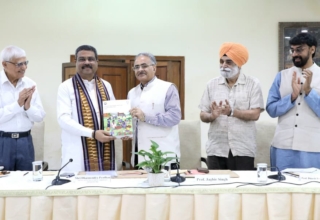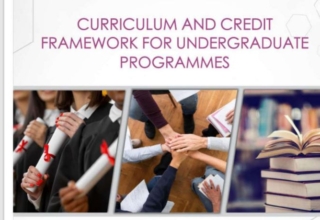Female leaders and researchers missing in higher education in South Asia
A new report has found that women in higher education in South Asia are not being identified and prepared for leadership. There is also evidence that when they do aspire for leadership they are frequently rejected from the most senior positions. It also found that many women academics in the region are reluctant to aim for senior leadership and perceive it as an unattractive career option. The research report, ‘Women in Higher Education Leadership in South Asia: Rejection, Refusal, Reluctance, Revisioning’ by Professor Louise Morley and Dr Barbara Crossouard, from the Centre of Higher Education and Equity research at the University of Sussex, was commissioned by the British Council. Based on research they conducted in six countries across South Asia (Afghanistan, Bangladesh, India, Nepal, Pakistan and Sri Lanka), they found that there are complex and multi-dimensional barriers to women’s leadership in higher education. These range from social, cultural and economic barriers in each country, the organisational culture in universities, discrimination in recruitment and selection, and unequal power relations. The report also found some enablers to women achieving leadership positions, including training and development, support and mentorship and international networks and mobility across the region. Only three per cent of vice-chancellors in India are women, with six of the 13 female vice chancellors found at women-only institutions
“First and foremost, most selection committees have only men. Very, very few have any women. Most that I’ve gone through, they’ve been all men on the committee, for any position,” says a female dean in India, describing in the report how universities’ selection procedures were exclusionary and discriminated against women.
Another recent report has found that a rise in female educational enrolment in South Asia is not leading to careers in research, to the long term detriment of the region. The report, based on data and interviews with education leaders across the region, has found that there are not enough women taking up careers in research in South Asia, and inequalities in the hiring process, unfavourable workplace practices and other institutional barriers may be to blame.
The report, ‘Defined by absence: Women and research in South Asia’ prepared by the Economist Intelligence Unit on behalf of the British Council, states that “The rise in female higher education participation has been driven by rising incomes, the creation of a rapidly growing labour market for the higher skilled and gradually changing attitudes regarding women in the workforce. Higher education has become both more affordable and often a pre-requisite to region’s competitive labour markets. However, female enrolment in postgraduate degree programmes has not risen as rapidly, and women as researchers are notably missing”. There is a serious lack of gender specific data on South Asia that can help evaluate the gap in the workplace. Good initiatives are in short supply, and in cases where they do exist sustainable funding can be a problem. The report suggests that this gender imbalance is not being taken seriously enough at the highest levels or by the women themselves.
New teams to inspect CBSE schools
The Central Board of Secondary Education has decided to form a team of principals and educators to inspect the affiliated schools across the country to ensure quality education. They will form a part of the external assessors who will evaluate schools on the basis of infrastructure and academics. “As a part of School Quality Assessment and Accreditation (SQAA), the Central Board of Secondary Education (CBSE) has decided that human agents performing quality assessments will be part of an external assessment team to ensure quality education,” said the CBSE. The CBSE in its School Quality Assessment and Accreditation (SQAA) Manual has specified that the team carrying out the external evaluation will be called ‘peer assessor team’, which will involve suitably qualified and experienced individuals. The schools affiliated with the board will be assessed through standardised processes of internal assessment (self-evaluation) and external assessment (peer review), which will encourage sustained qualitative enhancement. “Since the approach of the external assessors will be standardised and non-threatening, the CBSE will move a step towards achieving the objective of ensuring quality education in schools,” it added.
“The CBSE aims at forming a team of principals, whether working or retired and educators with a hand-on experience and rich insight in the process of school education. This will be the most effective way to improve the quality of education in India,” said Dr Sadhana Parashar, Director (Academics, Research, Training and Innovation) of the CBSE. To streamline the process of selection of ‘peer assessors’ and enhance transparency, the board has proposed to conduct an online screening test that will include multiple choice questions based on School Quality Assessment and Accreditation (SQAA) Manual
NHRC notice to Delhi Government over closure of Deepalaya run school in Okhla
The National Human Rights Commission has taken suo motu cognizance of a media report that unable to fulfill the stringent RTE rules, Deepalaya, a school for poor kids run by an NGO since the last 22 years in Okhla, New Delhi had to be shut down. The school had more than 600 students up to class eighth at the time of its closure in 2014. The Commission has observed that the contents of the press report, if true, raise a serious violation of right to education of children from lower income group. Accordingly, it has issued notices to the Chief Secretary and Secretary, Department of Education, Government of NCT of Delhi calling for reports within two weeks.
According to the media report, as per the RTE Act, it is necessary that the States which have implemented the Act should recognize the schools. And for the recognition of the school, it is necessary that the school has its own the land or has it on lease. Whereas, the NGO running Deepalaya, did not own the land nor it had on a lease. The school was being operated from a piece of land provided to the NGO by the Basti Vikas Kendra in 1992 under Community Development Programme. Moreover, the NGO could not pay the teachers’ salaries as per the 6th Pay Commission, which is required under the RTE Act. In absence of the recognition, the school has been shut down and is running as a tuition centre.
Telangana schools to be GIS mapped
Government schools will be freshly mapped with the Geographic Information System (GIS) in Telangana to show their exact infrastructural status with videos and photographs. The data would be made public. GIS mapping would allow the authorities to monitor the schools and the education delivery there. The government will also grade schools based on their performance and parameters like student-classroom ratio. School education department officials said the mapping will not only be based on their geographical location, but will use a distance matrix. The GIS mapping will allow the government to know the number of schools in a certain area and the distance of the schools from the nearest residential areas. Based on this data, the government will provide eligible schools with transport reimbursement under the Sarva Shiksha Abhiyan.
Six Govt schools handed over to private trust for failing to perform
Unable to keep up the merit in its schools in Gandhinagar, the Gujarat Secondary and Higher Secondary Examination Board (GSHSEB) has handed over all the six secondary and higher secondary government schools to a private trust on a token amount of Re 1 for 30 years.
Some of these schools posted results as low as 3.33 per cent in the last three years, in the board exams. This is the first such case of its kind which, if successful, will be replicated in government primary schools. “The reason for giving these schools to a private trust is to improve quality of education as the state board results were not very encouraging. It has been done on a trial basis as the results would be monitored regularly for three to five years and if this achieves the aim, the same might be implemented for primary schools as well,” confirmed the Additional Chief Secretary (Education) Arvind Agrawal.
Despite several measures taken by the education department in the last three years including organising special education programmes for students to achieve 33 per cent results, transferring teachers to other districts and even holding back teachers’ increments, these schools failed to achieve more than 30 per cent secondary results. The trust Sarva Vidyalaya Kelavani Mandal- is well known in North Gujarat. The trust was formed in 1919 and commenced its activities with a school and student residential ashram at Kadi in 1921 through donations from the society and through efforts of “Chhaganbha” who established this Mandal.
The District Education Officer would evaluate the performance of these schools and the number of students enrolled should also increase. One of the conditions is that the names of these schools will not be changed. All these six schools are named after Sardar Vallabhbhai Patel, Swami Vivekanand, Mahatma Gandhi, Aryabhatt, Maharana Pratap and Vikram Sarabhai. The department has also said that the trust cannot use the school’s building and infrastructure for anything other than educational activities. If these school buildings are already on rent, the same can be claimed by the trust as grant from the department. While no fee will be taken from the students, the teaching and non teaching staff is also to be retained in the schools.
GMAT like Employability Skill Test in offing
Association of Indian Universities (AIU) in Association with Wheebox and LinkedIn to Create Benchmark for Employability and Help Universities to take preemptive measures to improve various employability skills and make students job ready before they start applying for jobs. The three together are going to implementing a GMAT kind of exam called Wheebox Employability Skill Test (WEST) across universities all over India. This would create a benchmark for the recruiters & employers to compare potential applicants. Under this strategic association the undergraduate & post-graduate students will be made ready for the job market with employable skills. The students will take online adaptive test and thus will be provided with ranking that will be accessed to the influential network of professionals and recruiters on LinkedIn ( partner for publishing India Skills Report 2015 as well). These rankings are the single metric that is consistent across the applicant pool. It provides a benchmark to the employer’s network to compare candidates against one another and against the student profile. This test will also help Universities to take preemptive measures to improve employability skills based on scientific data provided by Wheebox. The exam is designed for 60 minutes that measures candidate’s English language proficiency, problem solving skills, numerical aptitude, computer literacy and soft skills viz. learning agility, interpersonal skills and adaptability for final year pass-outs. The test has been endorsed by CII that will measure critical competencies for employment of undergraduates and postgraduates.
Dr.Furqan Qamar, Secretary General AIU said, “ The percentage of employable students being low, which has been indicated from all the research reports, and this necessitated us to make the students employable and job ready that would be beneficial to both the employers & students.”
According to Nishant Rao, Country Manager (India) LinkedIn , “India has vast skill gap with less than half of all graduates are not employable in any sector based on industry standards. This has sparked growing concern about the mismatch between universities and the needs of the job market.”
National Book Promotion Policy sought
CEOs from the world of publishing and communication held out the view that while digital publishing is a great opportunity, print will not perish. In fact, the print medium will continue to grow and both will co-exist. This was expressed at the programme CEOSpeak Over Chairman’s Breakfast 2015, jointly organized by FICCI and the National Book Trust, India. The Indian publishing market is estimated between Rs 12,000 – 15,000 crore; India ranks 3rd in the world in English language publishing after USA and UK, the market is growing at 20% CAGR and over 100,000 titles are published per year.
The way forward suggested was implementation of the National Book Promotion Policy, which aims at promoting books to all segments of the society even in the remotest corners, creation of National IP Policy, a robust framework for protection of digital assets (DRM), creation/rejuvenation of libraries, grant “Industry Status” to the publishing sector, establish institutes to impart management & technical courses in publishing studies and leverage technology to reach out to readers in remote areas, while retaining the time tested strengths of publishing and distribution of books. It was noted that the converged digital domain and Intellectual Property is characterized by passive online consumers becoming active ‘prosumers'(producer-consumers) driven by convergence; social media is driving new disruptive business models but it also raises complex questions in the context of IP protection. It was also contemplated to bring Indian language publishers to mainstream publishing. Speakers expressed their concerns about the absence of even ISBN in book publishers by some small Indian language publishers. The representatives from the Government said that they are working towards creation of a conducive policy framework for the publishing sector to flourish. Over 130 CEOs from the publishing community participated at the programme.










